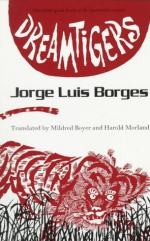|
This section contains 3,938 words (approx. 14 pages at 300 words per page) |

|
SOURCE: “Oriental Influences in Borges' Poetry: The Nature of the Haiku and Western Literature,” in Borges the Poet, edited by Carlos Cortinez, The University of Arkansas Press, 1986, pp. 170–81.
In the following essay, Kodama discusses Borges's use of the traditional Japanese poetic forms of tanka and haiku.
In the foreword to his Collected Writings (1969), and in other works, Borges has expressed many judgments on poetry and style which indicate the way he gradually assumed the essential poetic forms of the Japanese tanka and haiku. He attempted those two forms for the first time in El Oro de los Tigres (1972) and in La Cifra (1981). Borges began his prologue to the Collected Writings by claiming: “I have not rewritten the book. I have toned down its Baroque excesses, I have trimmed rough edges, I have blotted out sentimental verses and vagueness and, in the course of this labor sometimes pleasing and...
|
This section contains 3,938 words (approx. 14 pages at 300 words per page) |

|


